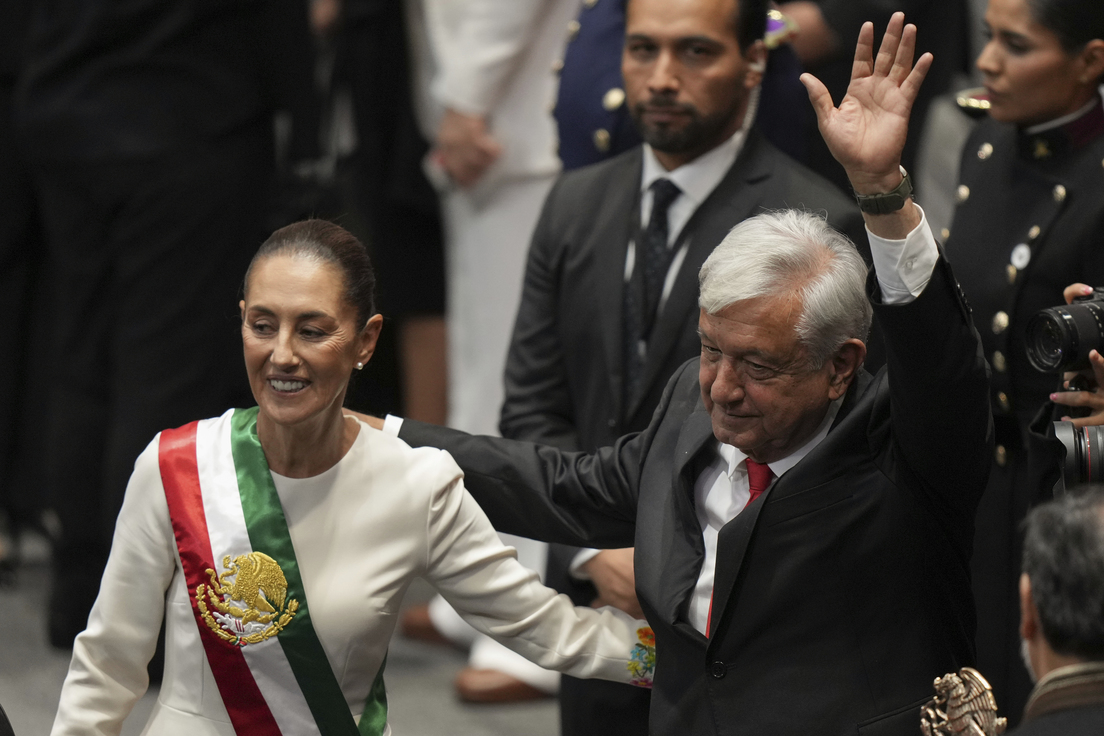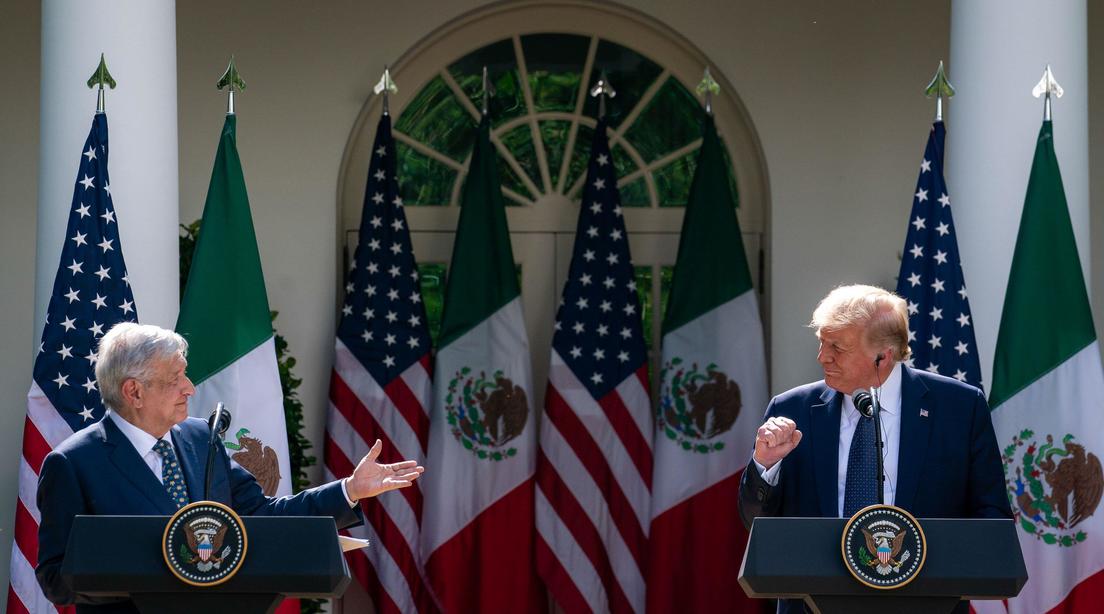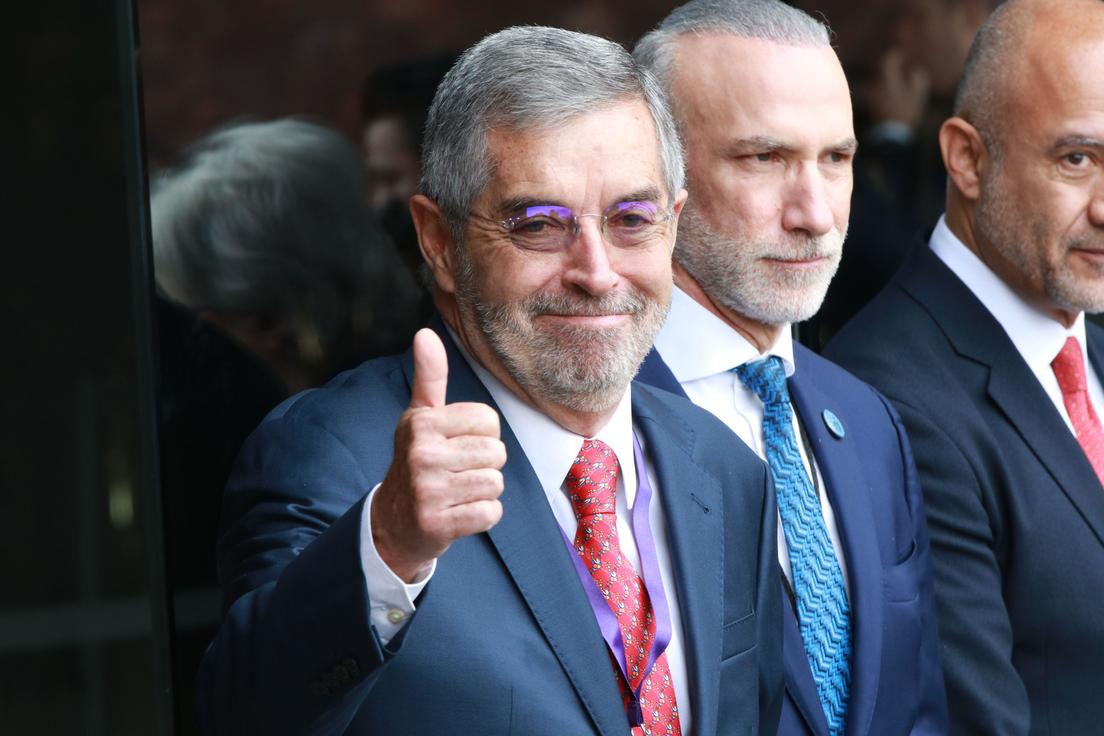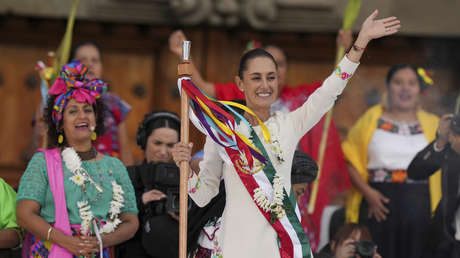Claudia Sheinbaum officially assumed the Presidency of Mexico this Tuesday, becoming the first woman to hold the country’s highest office.
After the ceremony, the new Mexican head of state listed the 100 commitments of her six-year term, described by her as “the second floor of the Fourth Transformation”among which he touched on the topic of foreign policy.
Claudia Sheinbaum assumed the position of president of Mexico from her predecessor, Andrés Manuel López Obrador, on October 1, in a ceremony held at the Legislative Palace. pic.twitter.com/RKpXaoxHx2
— RT in Spanish (@ActualidadRT) October 2, 2024
“Our foreign policy will follow the constitutional principles of self-determination of peoples, non-intervention and the peaceful resolution of disputes,” stood out the representative.
Still, Sheinbaum’s political background and academic experience make the question of what priorities will be at the forefront of Mexican diplomacy open to debate, experts say.
Echoes of AMLO’s politics or a new boost to presidential diplomacy?
In principle, Claudia Sheinbaum’s foreign policy will echo the basic parameters of President López Obrador’s foreign policyVíсtor Jeifets, professor at the Russian Academy of Sciences, director of the Center for Ibero-American Studies and editor-in-chief of the magazine Latin America, told RT.
Víctor Jeifets, director of the Center for Ibero-American Studies, editor-in-chief of the magazine América Latina
As his power consolidates, since Mexico is a country of large-scale presidentialism, Sheinbaum’s position will be more pragmatic
The professor believes that the new president will maintain the country’s low presence in international forums, where Mexico will not be present at the level of first people, thereby continuing the former head of state’s principle that “The best foreign policy is the domestic one.”


For her part, Ksenia Konovalova, a professor at Saint Petersburg State University, believes that the country’s new leader will become much more involved in presidential diplomacy and, with its arrival to power, Mexico will be represented in various forums, from the UN Climate Summit to the meetings of MIKTA (a group of Mexico, Indonesia, the Republic of Korea, Turkey and Australia).

Ksenia Konovalova, professor at St. Petersburg State University
Judging by her professional career, by her examples of rhetoric, one could suspect that Sheinbaum is a more systemic, more globalist politician than AMLO.
In his opinion, despite the fact that Sheinbaum and López Obrador are usually classified as center-left politicians, It is unlikely that the new president will retain the populist and patriotic image of the former president.
The expert believes that the new head of state is much more dedicated to the issues of sustainable development, climate change, the protection of human rights and the fight against discrimination. “It is most likely that these issues will reach Mexico’s international agenda.” and turn it more, than it was with AMLO, into a middle power that advocates globalization, existing universal institutions, multilateralism,” said Konovalova.
Cooperation with the US: waiting for a new tenant of the White House?
One of the key tests for the new Mexican president will be relations with its main trading partner and neighbor to the north, the United States. In recent weeks, relations between Washington and Mexico have been strained by US criticism of Andrés Manuel López Obrador’s judicial reform.
Furthermore, the electoral campaign in the North American country is in full swing, and the issue of migration, problematic for relations with Mexico, is one of the cornerstones of the electoral race.

Víctor Jeifets, director of the Center for Ibero-American Studies, editor-in-chief of the magazine América Latina
The Sheinbaum Administration may have a difficult relationship with Washington, but that does not depend on it, but on the fact that the internal political life of the US itself is full of turbulence at the moment.
The expert Víctor Jeifets suggests that the Sheinbaum Government would feel more comfortable working with a Democratic administration in the White House because they have a series of overlapping issues on the agenda of domestic politics.
However, Jeifets emphasizes that their agenda only coincides on a narrow range of value issues. “Sheinbaum has spoken harshly about the neoliberal nature of the country’s economy, which can cause a divergence of interests with large American companies,” the professor believes.


Although the previous head of state had a constructive relationship with Republican candidate Donald Trump, the professor points out that this does not mean that the current president will also have a cordial relationship with Trump if he wins.
“Sheinbaum, who personifies the female face of Mexican politicsdue to her psychological type, she will not be willing to accept the peculiarities of the misogyny that Trump suffers from,” says Jeifets.
In any case, the expert summarizes, “the US will continue to be Mexico’s key trading partner, and it is unlikely that the Government will try to fundamentally move away from this or, for example, participate in de-dollarization projects.”
The Latin American vector: new meanings in Mexican diplomacy?
Experts affirm that the Latin American direction will be one of the key directions of the new Mexican Government. “There are indications that the previous course of cautiously positive interaction with Bolivarian actorswith Cuba. Mexico can be expected to try to promote itself as impartial arbiter in regional contradictionsthe Venezuelan issue, but do not openly show solidarity with President Nicolás Maduro,” says Ksenia Konovalova.

Ksenia Konovalova, professor at St. Petersburg State University
Mexico, under Sheinbaum, if it plays a leadership role in Latin America, it will do so more in terms of development, human security, and the green agenda.
“I do not expect him to play a prominent role in supporting Latin American opponents of Washington and the liberal world order. In principle, such a position can also be presented through the prism of the doctrine of noninterferencewhich is relevant for the new Government,” concluded the expert.
Towards global governance and institutions
Experts agree that international organizations will play an important role for the new administration.
In this context, Víctor Jeifets emphasizes that, when defining the candidacy for chancellor, Claudia Sheinbaum opted for Juan Ramon de la Fuentewho held the position of Mexico’s representative to the UN from 2019 to 2023. According to the expert, in this sense, an increase in professionalization in the Mexican Ministry of Foreign Affairs can be expected.


“One of Sheinbaum’s priorities will be to increase Mexico’s role in global governance, within the logic of inclusive world developmentfrom the perspective of the interests of the Global South,” says Ksenia Konovalova.
According to the researcher, relationships with global actors will be built in a pragmatic way, in a way that contributes to attract capital, technology and strengthen Mexico’s position in the international division of labor.
Relations with Russia and the BRICS: a favorable view from the other side of the ocean?
When it comes to establishing a dialogue with Moscow, the new Sheinbaum Government cannot be expected to differ much from the previous one, experts agree.

Víctor Jeifets, director of the Center for Ibero-American Studies, editor-in-chief of the magazine América Latina
The main parameters of the position regarding Russia will be maintained. There is no need to expect any distancing. Mexico will not join the category of countries willing to impose sanctions against Moscow.
Jeifets adds that, due to its neutrality, Mexico will not take drastic measures to move closer to the Russian position.
A similar point of view is shared by Ksenia Konovalova, who emphasizes that the Morena party program mentions the priority of developing relations with the BRICS countries. “The other thing is that it probably won’t have to do with explosive and conflictive international issues,” adds the professor.


“Mexico does not welcome the hegemony of the US and the Euro-Atlantic countriesbut at the same time he is an actor who can hardly be described as enthusiastic about the idea of a multipolar world as a geopolitical balance between several powers or blocs,” says Konovalova.
As the researcher points out, this does not correspond to the country’s historical experience, its geopolitical position and its diplomatic traditions. “In Morena’s documents there are lines about the philosophy of multipolarism, but above all it refers to the importance of international cooperation, the rules and institutions where countries can have a voice and demonstrate an independent position without risking grievances with the established centers of power,” concludes the expert.
If you liked it, share it with your friends!


![[Img #74678]](https://thelatestnews.world/wp-content/uploads/2024/12/See-schizophrenia-and-bipolar-disorder-in-face-shape-150x150.jpg)










Add Comment